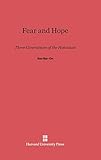Fear and Hope : Three Generations of the Holocaust / Dan Bar-On.
Material type: TextPublisher: Cambridge, MA : Harvard University Press, [2013]Copyright date: ©1995Edition: Reprint 2014Description: 1 online resource (372 p.)Content type:
TextPublisher: Cambridge, MA : Harvard University Press, [2013]Copyright date: ©1995Edition: Reprint 2014Description: 1 online resource (372 p.)Content type: - 9780674418905
- 9780674418912
- Biographies (Biography)
- Children of Holocaust survivors
- Erlebnisbericht
- Geschichte Europas
- Holocaust
- Judenvernichtung
- Konzentrationslager
- Nachkomme
- Overlevenden
- Uberlebender
- Children of Holocaust survivors -- Israel -- Biography
- Holocaust survivors -- Israel -- Biography
- Holocaust, Jewish (1939-1945) -- Personal narratives
- SOCIAL SCIENCE / Ethnic Studies / General
- PSYCHOLOGY / General
- 940.53/18/0922 B
- online - DeGruyter
| Item type | Current library | Call number | URL | Status | Notes | Barcode | |
|---|---|---|---|---|---|---|---|
 eBook
eBook
|
Biblioteca "Angelicum" Pont. Univ. S.Tommaso d'Aquino Nuvola online | online - DeGruyter (Browse shelf(Opens below)) | Online access | Not for loan (Accesso limitato) | Accesso per gli utenti autorizzati / Access for authorized users | (dgr)9780674418912 |
Frontmatter -- Contents -- The Interviewees -- Author’s Note -- Prologue -- Introduction -- 1. THE BELINSKYS -- 2. THE LERMANS -- 3. THE ANISEVITCHES -- 4. THE SEGALS -- 5. THE GUETTAS -- Epilogue -- Appendix. Notes. References. Index -- APPENDIX -- Notes -- References -- Index
restricted access online access with authorization star
http://purl.org/coar/access_right/c_16ec
Genia spent two years in Auschwitz. Ze'ev fought with the Partisans. Olga hid in the Aryan section of Warsaw. Anya fled to Russia. Laura lived in Libya under the Italian fascist regime. All five survived the Holocaust, emigrated to Israel, and started families there. How the traumatic experience of these survivors has been transmitted, even transformed, from one generation to the next is the focus of Fear and Hope. From survivors to grandchildren, members of these families narrate their own stories across three generations, revealing their different ways of confronting the original trauma of the Holocaust. Dan Bar-On's biographical analyses of these life stories identify several main themes that run throughout: how family members reconstruct major life events in their narratives, what stories remain untold, and what is remembered and what forgotten. Together, these life stories and analyses eloquently explore the intergenerational reverberations of the Holocaust, particularly the ongoing tension between achieving renewal in the present and preserving the past. We learn firsthand that the third generation often exerts a healing influence in these families: their spontaneous questions open blocked communications between their parents and their grandparents. And we see that those in the second generation, often viewed as passive recipients of familial fallout from the Holocaust, actually play a complex and active role in navigating between their parents and their children. This book has implications far beyond the horrific reality at its heart. A unique account of the interplay between individual biography and wider social and cultural processes, Fear and Hope offers a fresh perspective on the transgenerational effects of trauma--and new hope for families facing the formidable task of "working through."
Mode of access: Internet via World Wide Web.
In English.
Description based on online resource; title from PDF title page (publisher's Web site, viewed 29. Nov 2021)


